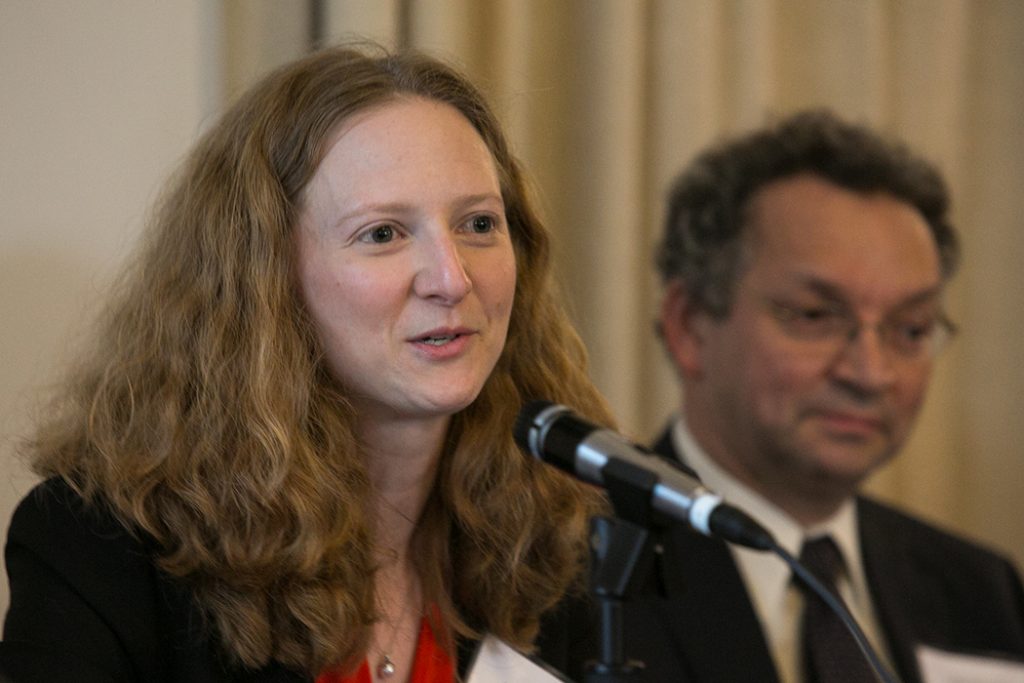Data is the side-view mirror of government. “It helps us figure out where our blind spots are,” said Daniel Koh, chief of staff to Boston Mayor Marty Walsh. “Because there’s only so much time and resources, data helps us give more to people in places we can’t be at that moment.”
During the “Governing in a Digital Age” symposium February 25 at BC Law, a number of panelists discussed the ways in which data is helping government leaders become more effective, improve fiscal management, and create a better place for people living in the Commonwealth of Massachusetts and beyond.
“If we can combine technology and data to make more fruitful dialogue, that’s a sweet spot we should strive for,” said panelist Holly St. Clair, director of Enterprise Data Management for Massachusetts.
Commenting on how citizens have become “hungry for data-driven information,” she explained that up to now many public agencies have mainly been sharing data on a need-to-know basis, but that she’s in favor of shifting toward a “responsibility to share.”
Sponsored by the Rappaport Center for Law and Public Policy at BC Law, the Lincoln Institute of Land Policy in Cambridge, the Civic Innovation Project in Boston, and the Government Lawyer’s Committee of the Women’s Bar Association of Massachusetts, the panel on “Data-Driven Leadership” focused heavily on data’s ability to help us speak a common language.
Lourdes German, who moderated the panel and is the founder of the Civic Innovation Project, posed questions concerning data’s role in government and whether it’s really working and helping government leaders make appropriate investments.
“Data in a vacuum is meaningless,” said Koh. “We need to not only think about how we scrutinize data but we also need to put context about how we look at it.”
Data equalizes the playing field, in that it enables members of differing communities to let numbers and analytics speak for their human experience.
Describing data as the “language of the 21st century government,” St. Clair said that the use of data helps start dialogue from the same level by creating a foundation for understanding, a dialogue that is hard to fit into a 6 to 8 p.m. town hall meeting.
“We make sophisticated asks of our citizens to engage with us,” she said. “We need technology to layer conversations…and help us figure out what we need to worry about 100 years from now.”
When the government can measure data in this way, it has the ability to inform policy makers, legislators, and leadership where and when government needs to step in.
Panelist Jennifer Sullivan, who serves as assistant secretary of the state’s Executive Office for Administration and Finance, said that one way her office uses data is to “reduce the administrative burden to get citizens what they need. A lot of the data we look at is in dollars and cents,” she explained, “but that’s not all we look at. We need to measure what we do and discuss outcomes that we want to drive.”
The panelists were careful to suggest that the use of technology would not replace the in-person conversations and experiences that have driven government up to this point.
According to Koh, there is a misconception that it’s either or. “If you’re using data in the right way, you can do more. …It’s a mutually enhancing experience [for constituents and government].”
In fact, the parties using this type of data are expanding. Panelist Anthony Flint said journalistic outlets have found it “irresistible” to get involved with this type of technology. Data teams at various newspapers have been focused on collecting, analyzing, and “packaging data in compelling ways.”
“There’s a Silicon Valley feel to the newsroom,” said Flint, who serves as the director of public affairs at the Lincoln Institute of Land Policy.
Whereas this panel thoughtfully answered “why” we need data, a second panel of the symposium answered the “how.” With representatives from Morgan Lewis, the ACLU, Massachusetts Governor Charlie Baker’s Office and the Massachusetts Attorney General’s Office, the second panel honed in on the challenges and opportunities within public records reform.


